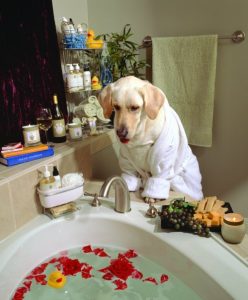Have you ever wondered what the difference was between a host bar vs. an open bar? I have to admit, I thought the two were one and the same until a few years ago when I was planning an event and without much thought chose host bar (clearly the wrong choice for my event) only to be stuck with a big bill at the end of the night. Needless to say, I should have done my research. So, what exactly is the difference? And how do you decide which is best for your event?

What is a Host Bar?
With a host bar, you are charged based on the amount of alcohol consumed. Venues may have different ways of measuring this. Some may charge you on a per drink basis and keep track of exactly how many drinks were ordered whereas others will measure the bottles at the end of the night and estimate how many drinks were consumed.
Host bars are often a good option if guests are not expected to drink very much because you only pay for what they order. There is a risk, however, that guests will order a drink, set it down, forget about it, and order another. For this reason, this is usually a good choice for corporate events rather than weddings or social functions as guests are less likely to drink as much.
What is an Open Bar?

With an open bar, the host pays an hourly rate plus a bartender fee. So, for a set amount of time, your guests will enjoy unlimited beverages. In an open bar situation, the host normally gets to choose the selection of wines, liquors, and beers that they would like to serve. Top shelf options demand a higher hourly rate but you know what that is up front so there are no surprises at the end of the night.
While you may think an open bar is the better option because of it’s “no surprises” guarantee, consider whether a lot of alcohol will be consumed. If not, an open bar is likely not the most cost effective option.
Some things to consider when deciding whether to have a host var vs open bar at your event are:
1 – Guest List
Study your guest list before you decide whether an open bar or a host bar is the best way to go. When the majority of the people invited don’t normally drink much, a host bar may be better than a cash bar as long as the per drink charge isn’t very high. On the other hand, if many guests are big drinkers, paying a per hour fee and having an open bar may be more cost-effective.
2 – Type of Event
If you are throwing a Company event to celebrate good financial results or throwing an annual company holiday party, limiting drinks or asking guests to pay for their own drinks is frowned upon although there may be some company events where this may be appropriate. Likewise, a low budget wedding or gala may warrant limiting alcohol costs for the host whereas a lavish wedding or auction where guests are expected to donate heavily may require hosts to foot the bar bill.

3 – Food Service
Consider what type and how much food will be served. People tend to drink less at sit down dinners than they do at an event with cocktails and passed appetizers.
4 – BYO (Alcohol)
Some venues allow the host to purchase alcohol themselves and hire a bartender to serve it. This can save a lot of money since there is often a mark up on alcohol through venues and bartending services. In addition, unopened bottles can be returned when the event is over. Remember that if you go this route, you will need to provide all of the barware, napkins, mixers, etc.

5 – Champagne Toast
If a champagne toast would normally be included in your event but you are considering an open bar, you may be able to save money and skip the champagne since many people already have a drink in front of them to toast with.
6 – Time of Day and Time of Year
People tend to drink more in the evening than in the morning or afternoon. In addition, they tend to drink more when it’s warm out and less when it’s cold although they may drink more expensive drinks (such as bourbon) in colder months.
7 – Cultural Norms
In some places or industries it may not be accepted to ask guests to pay for their own drinks or even to serve alcohol at all. It is important to consider what is polite and accepted month the guests.

8 – Potential for Overindulgence
If there is a risk that guests might drink too much, choosing a cash bar or offering drink tickets may help control the amount of alcohol consumed and costs associated with that.
9 – The Venue
Many times you will be restricted by the venue’s license. For example, a cash bar isn’t allowed in some venues because they don’t have the right license.
10 – Liability Laws
Venues often insist that all alcohol be served by a TIPS certified professional. People can’t bring their own alcohol and guests are not allowed to serve themselves. A TIPS professional will stop serving people who show signs of having too much. This reduces the chances of underage drinking ultimately protecting the venue and host.

Other Options
If you consider all of these things and decide that both open and host bars have some appeal but neither seems the perfect choice, you may have some other options so ask your venue whether they offer:
What is a Cash Bar?
Cash bars are exactly what they sound like. The bar is there and guests pay for any alcohol they consume using cash (or other approved methods of payment).

What is a Combination Bar?
Combination bars can help you limit the expense (and potentially the amount of alcohol consumed). These can be done by having an open bar for a set amount of time (i.e. an hour before dinner is served) or until the bill hits a certain dollar amount and then the bar turns into a cash bar. A combination bar can also be implemented by giving each guest a specified number of drink tickets.
What is a Limited Bar?
If the idea of having an open bar is appealing but the expense is not, you can limit the drink options. For example, only offer wine and beer and maybe a signature drink while skipping the top shelf liquors.
In the end, when deciding how the bar will operate, you should have 3 goals in mind;
1 – Align the type of bar with the type of event. Lavish = lavish and low budget = low budget – it’s just that simple.
2 – Make sure everyone has a good time. Alcohol can help loosen people up and get the party started but too much is definitely not a good thing.
3 – Adhere to your budget. Choosing the right type of bar for your event and audience can help ensure you don’t overspend.
What other event planning questions do you have? Email us at info@reventals.com and we will answer!















